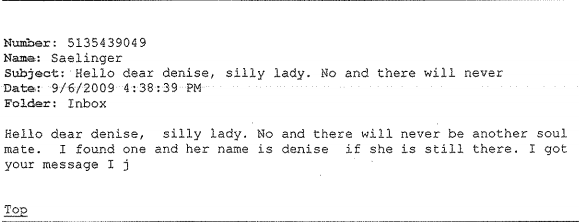Search
Adultery + “distressing” text messages = no sexual harassment
Hey there, Casanova. Dontchaknow that the victim always keeps the text messages? Always! But does the victim win the sexual-harassment case about which I am blogging after the jump? Hint: no.
Oh, come on! Don’t let that deter you! Click through anyway to pad my hit count and because you know I have the rest of the text messages and all of the dirty deets from a recent Bible Belt federal-court decision.
See you on the other side…
* * *
It’s a Lifetime Special, at best.
The case is Stevens v. Saint Elizabeth Medical Center. Here are the basic facts:
- Plaintiff is a nurse/personal assistant.
- Plaintiff works for — oh, let’s just call him “Doctor Married”.
- Plaintiff and Dr. Married had sex at work…a lot.
- Plaintiff liked to kiss and tell.
- Dr. Married repeatedly reassured Plaintiff that he was going to get a divorce.
- Dr. Married never divorced.
- So, Plaintiff broke it off with Dr. Married.
Plaintiff then began babysitting for Dr. Married and his children began suffering from mysterious illnesses.- Dr. Married continued to pursue Plaintiff. And boy did he love the text messages. Stuff like: “Denise, I am in love with you so big. I want to live the rest of my life with you. What is wrong. [sic] Please say we can meet for church tomorrow.”
Take a few seconds to cool down…
Let’s continue. Plaintiff complains to management. Plaintiff gets fired. Dr. Married gets fired. (If you couldn’t guess that the company’s rationale was employees bumpin’ uglies at work, then you need to contact an employment lawyer — hey, I’m an employment lawyer — about scheduling some Respect in the Workplace training at your place of business. Like now.). Plaintiff subsequently sues for sexual harassment.
Nothing to see here. No sexual harassment.
In Kentucky, a plaintiff who alleges sexual harassment based on a hostile work environment must establish five elements:
- She is a woman (check!)
- She was harassed based on sex (check!)
- The harassment had the effect of unreasonably interfering with her work performance and creating an objectively intimidating, hostile, or offensive work environment (ok, let’s stop here).
And why should we stop there? Please tell us Judge Danny C. Reeves from the Eastern District of Kentucky:
While the Court recognizes that these messages may have been unwelcome and even upsetting to Stevens, they clearly did not create an environment that a reasonable person would find objectively hostile… Moreover, Stevens’ own statements — that she found the messages and [Dr. Married’s] unspecified “conduct in the office” “distressing” and “occasionally” felt the need to avoid [him] — indicate that she did not even suffer subjectively severe and pervasive harassment.
Defendants win. And by win, I mean spend a boatload defending a case for which they will never get reimbursed.
Did I mention that Respect in the Workplace training is a good idea?
 The Employer Handbook Blog
The Employer Handbook Blog



